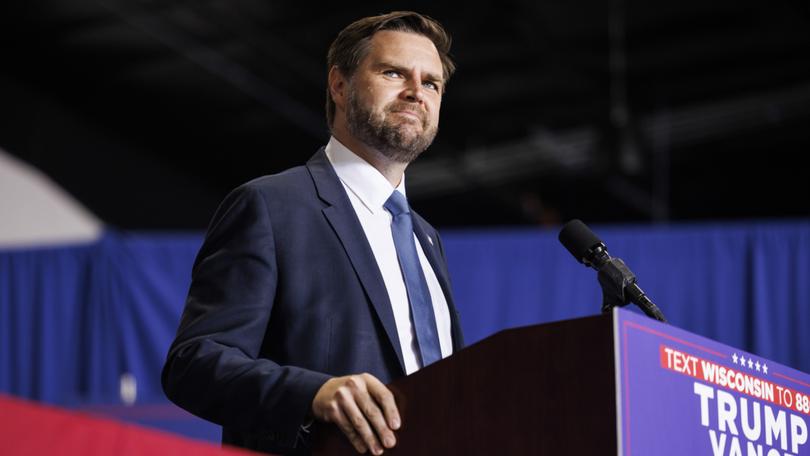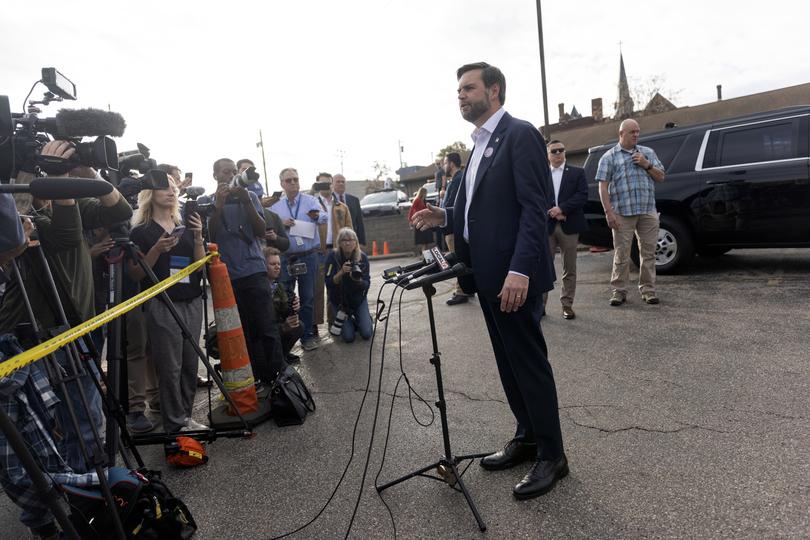THE NEW YORK TIMES: JD Vance, Trump’s MAGA successor, will be one of America’s youngest Vice Presidents
THE NEW YORK TIMES: JD Vance, a 40-year-old senator who transformed himself from a biting critic of Donald Trump to one of his fiercest defenders, was elected the next vice president of the United States.

JD Vance, a 40-year-old senator who transformed himself from a biting critic of Donald Trump to one of his fiercest defenders, was elected the next vice president of the United States on Wednesday, becoming the third youngest and among the least experienced and most polarizing politicians ever to hold the office.
The country’s 50th vice president will be sworn in just two years after assuming his first public office as a senator from Ohio. Vance is unlike any other vice president before him in the modern era: None has started the job with such an extensive public record of condemning his or her boss.
Sign up to The Nightly's newsletters.
Get the first look at the digital newspaper, curated daily stories and breaking headlines delivered to your inbox.
By continuing you agree to our Terms and Privacy Policy.He rose to national prominence with his 2016 memoir, “Hillbilly Elegy,” a bestseller that liberal voters devoured to better understand Trump’s victory and the frustrations of the white working class that had put him in the White House. Vance also seemed an ideal translator for Blue America as a Midwestern conservative who detested the new president, likening him in an essay to “cultural heroin.”
But Vance then started professing a change of heart and mind about the leader of his party as he prepared his own initial run for office. Trump not only forgave his young convert but also rewarded him with a game-changing endorsement in a fiercely competitive, four-way Senate primary and then, in the general election, helped push Vance’s underperforming campaign over the finish line.
Now, Vance is more politically indebted to Trump than any other vice president has been to the top of the ticket in modern times, said Joel Goldstein, a professor emeritus at the St. Louis University School of Law who has spent decades studying the vice presidency.
“When you have someone whose entire political career is owed to Donald Trump, it really raises a question as to whether JD Vance is somebody who is capable of telling him when he’s wrong,” Goldstein said.
Raised by his grandmother in a working-class town in Ohio as his mother struggled with drug addiction, Vance will soon be first in the presidential line of succession. His against-all-odds upbringing was a key component of his speeches on the campaign trail as he introduced himself to voters and sought common ground with Trump’s base of blue-collar supporters.
But Vance also has strong connections to deep-pocketed donors in Silicon Valley, including Peter Thiel, the iconoclastic tech pioneer and billionaire investor. Thiel, who hired Vance at his investment firm in 2017, spent $15 million on a super PAC that supported the Ohioan’s Senate bid in 2022.

Now, Vance has been all but anointed by Trump as the successor to the MAGA movement, driven by blue-collar voters who helped bolster two successful presidential campaigns in 2016 and 2024.
He performed on the trail just as Trump had instructed, as an indefatigable critic of Vice President Kamala Harris while delivering a sharp debate performance that cast himself as a more three-dimensional figure than the caricature portrayed by his critics.
A former media relations officer in the Marines, Vance also showed a preternatural skill at staying on message while performing one of the most challenging jobs in politics — defending Trump on live television. He sat for television interviews on Sunday news shows multiple times during his 16 weeks as Trump’s running mate and, in a unique move for a candidate on a presidential ticket, engaged in frequent exchanges with journalists by taking questions during many of his public events.
“He’s a fighter,” Donald Trump Jr., Trump’s eldest child, said of Vance at a rally while campaigning with him in Las Vegas in the final days of the race. “And, more importantly, what we have in JD is we now have an ‘America First’ bench — we have now people who can carry that torch, people unafraid to stand up to the tyranny of our government and fight.”
As Vance assists Trump in assembling an administration, a likely priority will be illegal immigration.
Vance promoted baseless claims that Haitian migrants were eating pets in Springfield, Ohio, and aggressively leaned into the Trump campaign’s description of violent gangs of migrants overtaking apartment complexes and towns across the country, claims that even Republican officials disputed as dangerously inaccurate.
He has called for mass deportations as the immediate and primary focus in a new Trump-Vance era, and he has promised to “ensure that American homes go to Americans.”
“Pack your bags, illegal immigrants,” Vance said at a rally last week in Selma, North Carolina, “because in three months, you’re going back home.”

He proved to be a skillful, dogged campaigner. In his four months on Trump’s ticket, he hosted 44 fundraisers, gave at least 149 interviews and held nearly seven dozen public events, a vast majority of which were in Pennsylvania, Michigan, North Carolina, Wisconsin and Arizona, according to the campaign.
And Vance reveled in the experience. He brought family members — most frequently his wife, Usha, a lawyer and the daughter of Indian immigrants — on the campaign plane, as well as occasionally the family dog, a German shepherd named Atlas. At a high-dollar event with the party’s elite in Tennessee, he was joined by his mother, who is recovering from her addiction.
To walk beside Trump is to reconcile with the ubiquity of controversy. That means the political test for Trump Republicans is less about dodging scandals and more about surviving them.
For Vance, that included an onslaught of criticism immediately after joining the ticket for his jolting put-downs of “childless cat ladies.” He had eagerly brandished the phrase to attack public officials without biological children, revealing a disregard for blended families or adoption.
As the pressure mounted, he ripped a page from the Trump playbook and refused to back down. Vance said later that he regretted the phrasing but stood by the sentiment. He pivoted to attacking the news media or portraying himself as the victim of a hostile press.
On the campaign trail, Vance followed his running mate’s lead with attacks that critics denounced as misogynistic, including a barb in the final days of the race that seized on a remark from President Joe Biden, who appeared to have referred to Trump supporters as “garbage.”
“We’re going to take out the trash,” Vance said at an Atlanta rally. “And the trash’s name is Kamala Harris.”
Vance never apologized for his false attacks on Haitian migrants — even after the town’s mayor and the state’s governor, both fellow Republicans, refuted and condemned the claims. Instead, Vance claimed that he was simply passing along complaints from concerned constituents.
Vance also managed to avoid minefields in his well-received performance in the vice-presidential debate. He surprised critics by refusing to rely on his well-worn attacks against Gov. Tim Walz of Minnesota, his Democratic counterpart, and instead seeking common ground. He also unspooled some bold claims to help him sidestep some questions.
He shrugged off the violence from the Jan. 6, 2021, riot at the Capitol by pointing out that Trump peacefully left office two weeks later. He suggested Trump had saved Obamacare, despite his having tried repeatedly to erase it from federal law. And he said he favoured policies “to give women more options” when it came to abortion, without saying that, for him, abortion is not one of those options.
Vance will become the nation’s youngest vice president since 1953, when Richard Nixon, who celebrated his 40th birthday just days before inauguration, was sworn in as Dwight Eisenhower’s vice president. John C. Breckinridge, who was 36 when he assumed office in 1857 as James Buchanan’s vice president, holds the record for the nation’s youngest vice president.
Both of the younger vice presidents eventually sought the White House themselves.
This article originally appeared in The New York Times.
© 2024 The New York Times Company
Originally published on The New York Times
